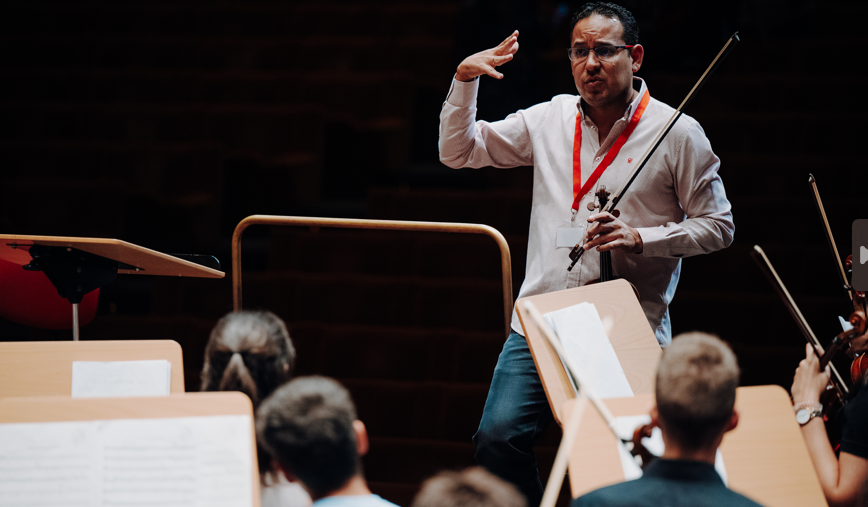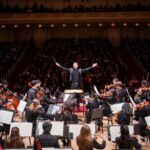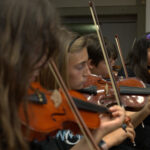We were delighted to welcome our esteemed friend and partner, Juan Carlos Maggiorani, during the Matosinhos Quartet’s recent visit to Athens. As a distinguished musician and Artistic Director of Orquestra Geração, Juan Carlos met with our musicians, performed for them, and shared invaluable insights from his illustrious career. In our enlightening interview, we explored his journey from childhood to his professional achievements, gaining a deeper understanding of his pivotal role within El Sistema over the years.
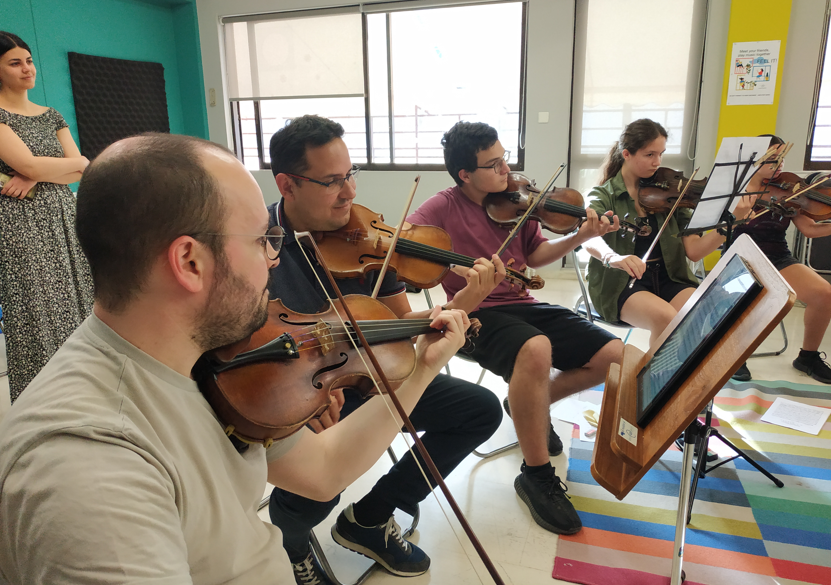
Your career spans many prestigious institutions and projects. What initially drew you to music, and specifically to the violin?
I always had the dream to travel the world with my violin. When I was 6 years old my teacher asked me what I wanted to play and I said the violin and from there I began playing. I was also largely influenced by my sisters who were in a school that was very active in music.
Did you go to a music school?
The school I was studying at had a conservatory, an orchestra, everything, so I could play music. I also studied the violin outside the El Sistema program in a private program outside of school. When I was thirteen years old I realized I wanted to be a real musician. I wanted to spend my life in music. So, I decided to audition for El Sistema when I was thirteen years old. This was my first experience in a semi-professional environment and it had a huge impact on me. It was a transition from doing music because I like doing it more professionally. The music was a lot more complex. I learned many things. I learned from my colleagues through imitation. I played in big music halls, namely the Teresa Carreño Cultural Complex hall, which was huge for me. Everything was big for me, it was a huge experience.
How long did you stay in the El Sistema music programs?
I stayed within the El Sistema programs until 18-19 years old. This had a huge impact on me. When I played my first concerts I think I only played about 50% of the notes, but my motivation was at 1000%. I should also mention that I received an El Sistema scholarship which gave me some independence in my musical experience. Then, at 18-19 years old I decided to follow my first dream, to travel the world with my violin independently. I said, the orchestral experience that El Sistema gave me is amazing, it gave me the best base I could have, but I wanted to pursue my first dream independently. I said to myself, it doesn’t matter where I will be in Venezuela, Portugal, Greece, Russia, I will do my best.
How has your musical experience within El Sistema shaped your music career outside of El Sistema work?
In El Sistema you are involved directly and you are inspired to pursue your dreams. The people around you make you feel like everything is possible. The experience is very complete – it is not just the orchestra, you have specific academies for different instruments. El Sistema gives you access to so many things. It is like a big family so everything is connected.
What it gave me is a base, the energy, the principle – it taught me that you have to dream, to overcome your capacity. Essentially, it helped push me forward, to look for excellence and fight for my dreams. It also gave me principles. It gave me a strong feeling of responsibility and discipline which I carried forward in other aspects of my work life afterwards.
Between 18-20 I received a scholarship that allowed me to come to Europe. This was the Mozarteum scholarship. I came to the Reina Sofía School in Madrid. I auditioned and I succeeded, and so I began my journey in Europe in Madrid for a music summer camp.
Can you tell us about your experiences studying under prominent mentors like Zakhar Bron and Rainer Schmidt? How did their guidance shape your approach to music?
After this camp, I stayed in Europe to finish school and then I was encouraged by my sister to pursue a position in a course by Zakhar Bron’s in Spain. It was one of the most beautiful experiences I had.
Differently to my experience learning in El Sistema, with Zakhar Bron it was an amazing experience to study music as an art – the highest quality of art, and so learn how to play the violin at a very high level. I learned how to navigate being in a competitive environment, because I was constantly around the best violinists.
Something else is that I’ve always loved playing chamber music. I think this is because in Venezuela we have this big culture of community and so I grew up with this ingrained team spirit. When I was in Portugal I won a prize for youth chamber music.
In the Reina Sofía school my teacher for chamber music was Rainer Schmidt in the new (at the time) International Institute of Chamber Music. The Institute had opened up positions only for quartets, so when I found out I thought this is the opportunity! I reached out to my colleagues, Marco (the cellist) who was with me in Reina Sofía and then Vitor and Jorge who both traveled from the US. So I said guys, we have the opportunity, let’s audition!
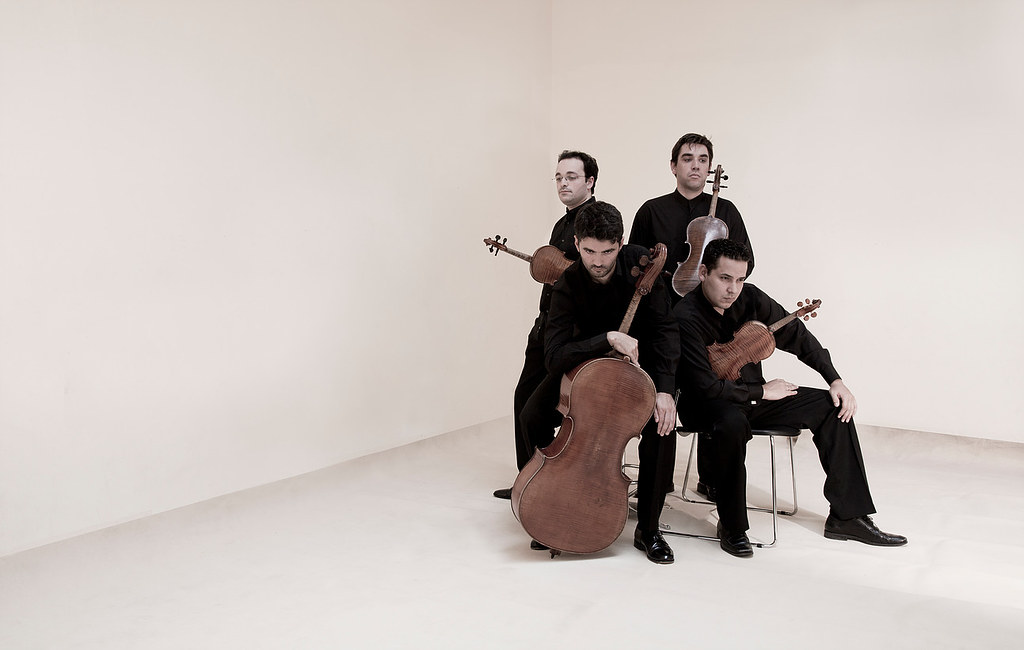
Your quartet, the Matosinhos String Quartet, has received numerous accolades. How did your journey begin and what do you believe contributes to the ensemble’s success and cohesion?
Taking it from the beginning, we had met in high school in Lisbon and we had won a prize there. Afterwards we split – Vitor and Jorge were in the US. We decided to come together after parting ways. When they opened the institute in Madrid, we auditioned, got in and specialized in quartet music for a year there under Schmidt’s guidance. Afterwards Schmidt decided to move to Basel and I considered following her, however at the same time something else came up.
The cultural affairs office of the city of Matosinhos in Portugal was very interested in having a quartet as a professional resident group there. They announced a competition, which we of course enrolled in and won. This is why we are called the Matosinhos String Quartet. This was seventeen years ago.
At that moment I also received another call from El Sistema that they wanted to create another base in Lisbon. So at this moment, in 2007, the Quartet began and I began the project of Orquestra Geraçao. When we began there were just fifteen students, five teachers and we only had strings.
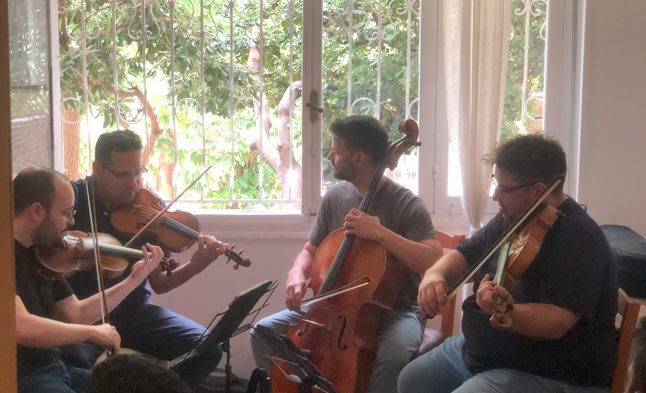
You’ve been recognized for your work with Orquestra Geração. What are some of the most rewarding aspects of this initiative?
When I received the invitation I immediately said yes. It was the perfect opportunity to give back to the community that had given me so much growing up. I believe in the transformative power of music, because I lived it myself. There were doubts about how this initiative could work, but I was optimistic that I would do my best. The spirit was fantastic. It was an amazing opportunity as a teacher, as a leader to tackle questions and challenges, without necessarily having the answers.
This is the beauty of El Sistema, there is creation in all parts of the process. This was an opportunity to reinvent things and reinvent myself. To think about what music means to me, to think about how to use music in a transformative way.
It was also a beautiful experience to grow in a different way as a teacher, as a human being, as a leader; because for example you may have to be an artistic director, but also a director of a school, and then can you work in production, or in the communication part? So it was a beautiful place to explore and learn through everything. So upon the first glance you may feel fear, but then that changes. And you know, I’ve never seen the Orquestra Geraçao as a job, no, never. I always said it was a challenge and a good way to be generous. Because as I gave a lot to it, I got so much more back too from the kids.
What are the biggest challenges facing orchestral music today, and how can musicians and educators address these challenges?
Orchestras are a beautiful community of harmony, compassion, friendship and leadership. The most important thing about music is how it can transform the kids, the youth. That is why it is important to keep giving the opportunities to kids to be part of orchestras. So the most important thing as an educator is to keep providing opportunities for young people, to showcase music as a way to overcome challenges, and also to showcase excellence. For me, music is everything, and excellence is not about playing the best way. The importance is to carry a message through your music, and this is the thing I want to transmit to the kids.
Music is a vehicle for transformation, so as educators, it is very important to adapt to new realities and try to find the connection between music and social matters. Finally, it is important to highlight to your students how they can be part of a community through music, or perhaps be a symbol to their community through music.
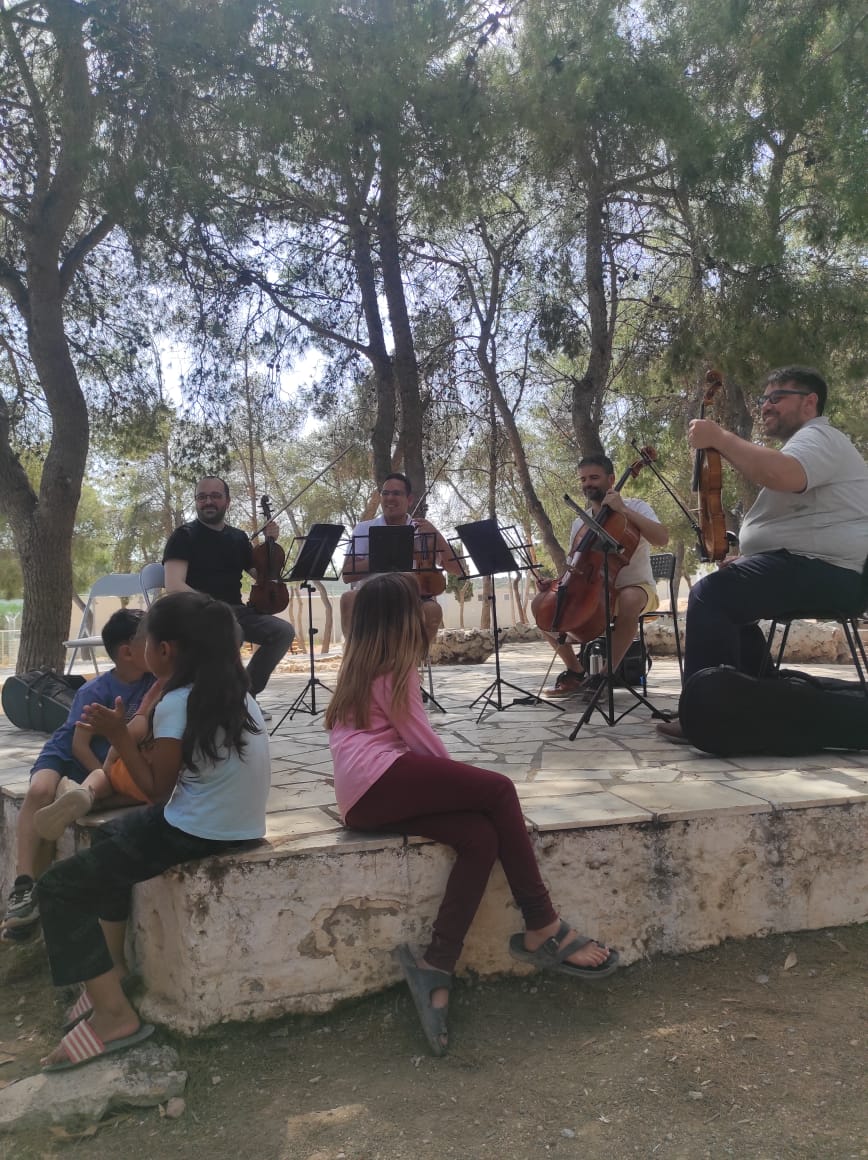
What advice would you give to young musicians aspiring to follow in your footsteps and make a mark in both performance and education?
My advice would be to believe in yourself, do the best that you can do for yourself, and be happy with the work that you do. When you dedicate time to something that you love, it is never going to be something too heavy or too difficult. So, believe in yourself, pursue your dreams and do not forget your objectives while doing so.
I believe being part of an orchestra on this front really allows you to dream together. You can share the adventure with your colleagues.
Also, don’t hesitate, take risks. If you fail, don’t be afraid of your mistakes. Even if it doesn’t work out you always learn something along the way. So give the opportunity to your kids, to your students!
The key is to be happy and to be passionate. If you care about what you are doing you will have passion and you will find happiness through it.
What are your goals for the future of the Orquestra Geração?
We have a lot of dreams – we don’t have limits about what we want to do. We try to give music to as many people, as many students as possible. We can try to dream together with the kids and prepare them for professional life and empower them. We are now preparing mentors for the next generation – future leaders.
As someone who has worked as a soloist, as a member of an orchestra, as a member of chamber orchestra then as a pedagogist you learn from every part of the process.
One of my next dreams is to try to broaden the family of sistema programs and beyond. We want to bring more musicians into these social programs beyond just classical music. Music allows us to bridge differences and encourage diversity. In music we are all equal.
*Interview by Maria Eirini Liodi


